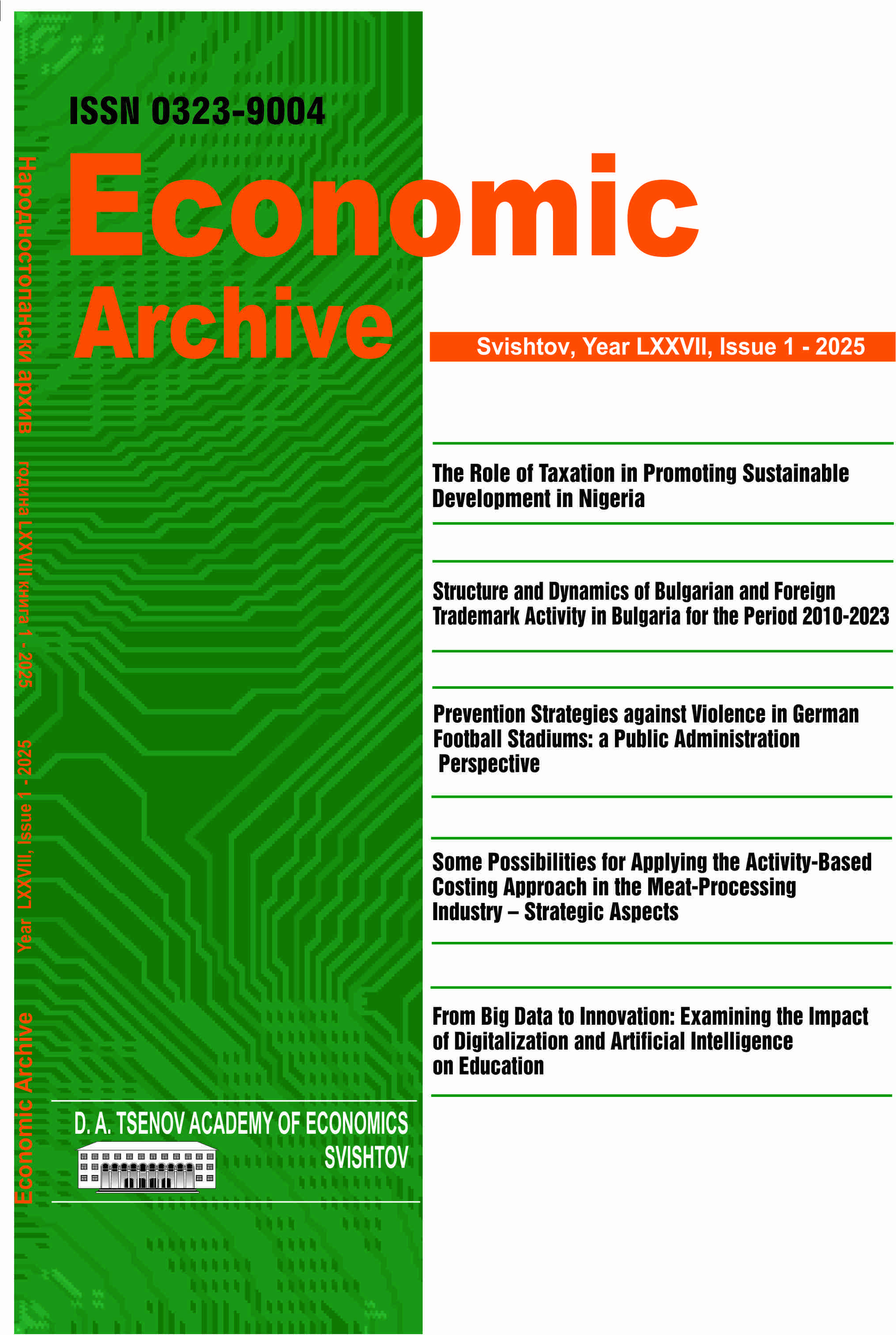
Cordelia Onyinyechi Omodero, Ishola Ayobami Olatunji The Role of Taxation in Promoting Sustainable Development in Nigeria / 3 Ventsislava Aleksandrova Nikolova-Minkova Structure and Dynamics of Bulgarian and Foreign Trademark Activity in Bulgaria for the Period 2010-2023 / 36 Mihail Chipriyanov, Raphael Röettinger Prevention Strategies against Violence in German Football Stadiums: a Public Administration Perspective / 57 Rayna Stoyanova Petrova, Silviya Petrova Chukanska Some Possibilities for Applying the Activity-Based Costing Approach in the Meat-Processing Industry – Strategic Aspects / 71 Mariana B. Kovacheva From Big Data to Innovation: Examining the Impact of Digitalization and Artificial Intelligence on Education / 94

This research examined the nexus between taxation and sustainable development in Nigeria. The study’s specific objectives were to investigate how company income tax, petroleum profit tax, and value added tax would affect sustainable development, measured by per capita ...

As one of the objects of industrial property of increasing importance in recent years, trademarks are a preferred tool for influencing consumer attitudes and increasing the recognition of companies. However, research in the field of the structure of trademark activity ...

This study investigates the role of public administration in the development and implementation of effective security measures in German football stadiums. Using a qualitative research approach, the study combines an extensive literature review with an analysis of ...

Issues related to cost calculation are becoming increasingly significant in the competitive environment in which modern economic entities operate. The continuous improvement of the activity-based costing approach and its expansion in a strategic aspect have led to its ...

Technology plays a fundamental role in an increasingly digital and dynamic world. This article explores digital transformation and innovations in education, such as Big Data and Artificial Intelligence (AI), not only as the adoption of the latest technologies but also ...

"Economic Archive" is the first academic economic journal in Bulgaria. From 1st of January 2017 the English language title of the journal is changed from “Narodnostopanski archiv” (transliterated from Bulgarian) to “Economic Archive”. The decision to be issued under the name "Narodostopanski archiv" (changed to "Narodnostopanski archiv", now “Economic Archive”) was taken at a meeting of the Academic Council of October 1st 1945 (recorded in Protocol ¹ 100). A quarterly period of issue was

Requirements for submission of papers for "Economic Archive" journal.
1. Number of pages: minimum - 12 pages;
maximum - 20 pages.
2. Submission of papers:
a printout (paper) and an electronic version(CD);
abstracts of half a page;
Card of the author (s) with E-mail and GSM.
3. Technical specifications:
Word 7.0 (minimum);
page size A4, 29-31 lines and 60-65 characters per line;
font -
„Economic Archive“ journal is a scientific economic periodical of D. A.Tsenov Academy of Economics- Svishtov. In Book 1 of 1946, in the editorial of Prof. Todor Vladigerov, the foundations of the editorial policy of the journal were laid: "... to discuss and propose solutions to current problems of the economy ...".
The journal is published in four books a year.
In 2009, the Journal launched its international issue in English, in which the translations of the leading publishing articles from the previous year were presented. Since 2013 the journal has been published as a bilingual edition (in Bulgarian and English). Since 2014 the journal has been freely accessible and available on the Internet (http://www2.uni-svishtov.bg/nsarhiv/).
The Currency Board in Bulgaria: Theoretical Reflections and Empirical Results
Via this article the authors would like to discuss the idea of the inter-section point of theoretical reflections and reported empirical results referring to the currency board in Bulgaria. To achieve the goal defined the article is structured in the following separate sections: first, clarification of the concept of a currency board in light of leading theoretical research; second, critical analysis and evaluation of the characteristics of the currency board in Bulgaria; third, justification ...
FUTURE EURO AREA MEMBERSHIP OF BULGARIA IN TERMS OF THE BUSINESS CYCLE
In the present paper, vector autoregression (VAR) is used to assess the extent to which Bulgaria’s economic cycle is synchronized with the one of the euro area (EA). The main fiscal and monetary factors affecting the coordination of the business cycles of Bulgaria and the EA are identified. Recommendations for macroeconomic policies are formulated to support the synchronization of Bulgaria’s economic cycle with the one of the EA and to prepare our country for the adoption of the euro. ...
A New Yuan or a New Monetary System
The research area of the present study is the Chinese yuan (renminbi). The research subject is the evolution of the Chinese yuan from a national to a global reserve currency. The paper tests the proposition that the rise of the Chinese currency is a sign of deep and qualitative changes in the international monetary system. The aim of the study is to analyse and track the evolution in the current situation in the international monetary system, in order to highlight the factors and the reasons ...